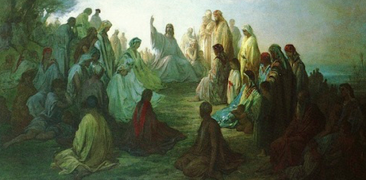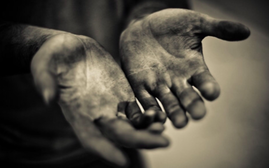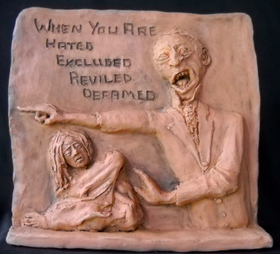Wasted Rough Cut: Listening to Jesus' Beatitudes (in Luke) and not robbing the poor of their power.1/16/2022 *The following is a set of sermon prep-notes and ideas for my sermon on Jesus' Beatitudes as Luke presents them in his Gospel.  I am amazed, and saddened as well, the lengths Christians, even commentators, will go to read out the “poor” in a vast majority of Bible texts that are so clear and should be necessarily inferred as actual poor. This robs this text in Luke 6 of its gospel-transforming-power, especially with regard to Jesus’ words in the Beatitudes. In Luke 6:20b we read, “Blessed are you who are poor, for yours is the kingdom of God.” (Below I offer my own translation of this verse.) One would think a learned degree is not necessary to hear Luke sets Jesus’ reference to the “poor” in contrast to his equally disturbing reference to the “rich” in what is obviously a paralleled statement in Luke 6:24: “But woe to you who are rich, for you have received your consolation.” In fact, it is much harder to spiritualize Jesus’ reference to the “rich” than it is his reference to the “poor.” This can be seen by the fact hardly anyone does. Luke’s Gospel is filled with such contrasting of the poor and the rich in Jesus’ teachings and in forthcoming parables that we cannot escape something about actual “rich” and actual “poor” is afoot. For example, in Luke 16:20, Jesus compares the poor beggar with the rich man who disregards the beggar only to discover the poor beggar is the one who is blessed in heaven while he was filled (satisfied) on earth: “but now he [the poor beggar] is comforted here [after death], and you [the rich man] are in anguish [after death]” (16:25b). Certainly, given the wider narrative context, there is a link (i.e., a clear and necessary inference) between the “Blessed are . .” and the “But woe to you . . .” contrasted sets in the Luke 6 Beatitudes. This poor/rich contrast is also seen in Luke 21:2, when Luke/Jesus refers to a “poor widow” in contrast to the rich and the pompous pharisees. Later, in Luke 7:22, the proof that Jesus is the messiah and that the kingdom of God had arrived is given by observing what was happening in Jesus’ ministry: “And he answered them, ‘Go and tell John what you have seen and heard: the blind receive their sight, the lame walk, lepers are cleansed, and the deaf hear, the dead are raised up, the poor have good news preached to them.’” Again, in Jesus’ parable of the great feast in Luke 14, the rich are instructed to not invited those who can repay, but invite the poor who cannot repay–again, here is that link to the Luke 6 Beatitudes. (There is also a narrative link to the forthcoming poor beggar/rich man scene in Luke 16 as well.) “But when you give a feast, invite the poor, the crippled, the lame, the blind, and you will be blessed, because they cannot repay you. For you will be repaid at the resurrection of the just” (Luke 14:13). Even when the context and the clear narrative meaning of the text is referencing the actual poor there is a tendency to read out the poor and read in anyone who is “poor of heart.” That certainly keeps the rich satisfied and the poor, well, still poor. This disallows the obvious social/institutional system-contrast Luke has already set up for us in his introduction, that is Mary’s song: he has brought down the mighty from their thrones and exalted those of humble estate; he has filled the hungry with good things, and the rich he has sent away empty (Luke 1:52-53). Thus, restoring the gospel-transforming-power we have robbed from the Beatitudes by reading out the poor from this text.  Luke 6:20b: Μακάριοι οἱ πτωχοί, ὅτι ὑμετέρα ἐστὶν ἡ βασιλεία τοῦ θεοῦ. ESV: “Blessed are you who are poor, for yours is the kingdom of God.” My wooden translation: “Flourishing*, the poor (the marginal and powerless), because allotted to you** is the kingdom of God.” Smoothed out: “Flourishing is the marginal and powerless, because to you—the marginal and powerless—is allotted the Kingdom of God.” I try to pay attention to how early church writers render texts of Scripture. Tertullian (155 AD–220 AD) gave Luke 6:20 and this Beatitude the latin beati mendici—“Blessed are the needy,” or “Blessed are the beggars.” He is not the only one who translated the word πτωχοί as “beggar.” While it (i.e., “πτωχοί,” poor) can and probably does simply mean the “poor” (its detonated meaning), its connotative meaning gives a more powerful nuance. For example: The word we translate “poor,” πτωχοί is vivid: one who crouches (as in shamed to be seen) and cringes (as in cowering in the presence of others), thus it is often used of “beggars.” No doubt it carries the concrete reference to someone who is needy, someone who has no power, someone we typically call “marginal” and powerless in society, and in the ancient world one who would have been called “not-or sub-human.” The two times Luke uses this word associated with a particular person are the beggar named Lazarus (being contrasted with the rich man who had everything and disregarded Lazarus, 16:20) and the poor widow vs. the rich/the duplicitous scribes (21:2)—can’t you see what Luke is doing between the Beatitude promise/affirmations and the wider story in his Gospel narrative? There are more of these throughout the Gospel (see chapter 14 for example). The word we typically render the “poor” (πτωχοί) is better understood by how it is used. While it is certainly can be used metaphorically to mean humble,*** or as a Christian virtue, or still better, more simply, as not-arrogant, there is a reason why this word can be used this way. The word has a concrete meaning range of someone without economic means, who is marginal and powerless–again, this is why the word “beggar” isn’t a stretch and certainly fits Luke’s other uses of the word throughout his Gospel. And, it also fits the extremes of the power/powerlessness contrasts that Luke uses to describe the arrival of Messiah and the teachings/parables Jesus uses throughout Luke’s Gospel: beggar (the least and the most without power) vs. the rich (or the mighty, those who have the resources but do not share with the poor, and/or those who do only to/for those who can pay back). You can see how Luke has shaped his Gospel and why it seems a necessary inference to take “the poor” in the Beatitude as exactly that, the poor as in the marginal and powerless. *”Flourishing” is a far better translation for Μακάριοι than either “blessed” or “happy.” **The “you” is a bigger word than the simple pronoun σύ (you), but as you can see is the word ὑμετέρα, which carries the idea of “allotted to you” or “possessed by you.” Split hairs which nuance, but since this is God’s action or promise I lean toward the nuance of “allotted.” ***In the Greek world, the nuanced meaning of “humble” or as a Christian virtue is a much later connotative meaning given this word, πτωχοί, and should not be read back in to how Luke is using the “poor” / “rich” contrast and comparison.  “Blessed are you when people hate you and when they exclude you and revile you and spurn your name as evil, on account of the Son of Man!” (Luke 6:22). While I agree these words are directed at disciples, who will become Jesus’ representatives (probably the meaning behind “on account of the Son of Man,” v. 22e), the description here plays double-duty. Obviously (because we have the whole of the NT to give us fuller understanding) just because one is “poor” or “hungry” or weeping (probably all three is one group), this does not mean they do not need to be born again or qualifies them as automatically born again (something that needs to happen in order for sins to be forgiven, be justified before God, and gain eternal life). Nonetheless, it should be pointed out that “crowd” who came for healing and exorcism would not have been the ones honored nor socially accepted in either the Greco-Roman world nor the Jewish world for that matter. They'd have been the truly marginalized, rejected, and considered sub-human. “. . . a great multitude of people from all Judea and Jerusalem and the seacoast of Tyre and Sidon, who came to hear him and to be healed of their diseases. And those who were troubled with unclean spirits were cured” (Luke 6:17c–18). They would have too easily identified with being hated, being excluded (separated, marginalized, rejected, avoided, ostracize), being reviled, and shunned. The dirty, shameful words trigger: diseased and possessed of unclean spirits. This was their lot, their place in the social castes and institutional systems of the world. The “apostles” that were just chosen (6:13-16), along with the “great crowd of his disciples” (v. 17b), whom the sermon is directed (v. 20), while the larger crowd was listening in—the teaching was very public (and outdoors I might point out!)—they would be as marginalized as the ones who came for healing and who troubled with unclean spirits. Jesus’ appointed representatives (the apostles) and followers (the wider crowd of disciples) would be the poor, the hungry, and those weeping—everything would be turned on its head and the world, its social structure and institutions would hate, marginalize, revile, and spurn those who were truly the blessed, that is the apostles and disciples of Jesus who followed Him and proclaimed this teaching—all on account of being the representatives of the Son of Man, those whom Jesus was reproducing Himself in the world. Yet it would be to them the kingdom belongs, their stomachs would be full (satisfied), and fulled with joy. The appearance of Messiah Jesus and the proclamation of the Gospel—as Jesus’ inaugural sermon indicated (Luke 4:18-19; cf. Isaiah 61:1-2 and 58:6-7)—changes everything about how the systems and structures of this world work (cf. Luke 1:51-53). This is what the beatitudes indicate and mean–and how they should be applied. However, we have traded this all away by making the church (and by that I mean churches and their institutionalized systems) reproduce the world in everything from measures of success to leadership and training to evangelism and (sadly) in our ways of doing and measuring being missional. Discipleship, too often, mimics how the world works rather than what the Beatitudes display.  Lastly, discipleship is not one size fits all. The way Luke has presented Jesus’ Beatitudes is more to expose the structural and systemic, institutionalized empire (Rome-centered, adamic natured) way of defining who is and who is not blessed, who is and who is not honored, who is and who is not fully (or at all) human. What divides humanity. And, addresses the danger of using the world’s way of addressing the issues of poverty and affluence. Take the poor out of Jesus’ reference to the poor and this is lost. This–that is, the Beatitudes are not about “salvation” (that is getting into the Kingdom of God), but about what the new community of God looks like, how it’s system, if you will, works. And this means applying discipleship somewhat (not entirely, but in some specifics) differently to rich disciples and poor disciples. The way to blessing (i.e., kingdom flourishing) is not the way of the world–it is a wholly other way (or as the title of a book I am reading puts it, not the way of the dragon, but the way of the Lamb). Christianity, that is our faith in Christ and our relationship to the church, is not a pathway to success (that is being one of the “rich”). And, our present power granted to us by our place or status in the social structure and current institutions no longer defines us and our neighbors. If one is among the “rich” one best rethink their relationship to the poor and adjust appropriately. Other Sermon on the Plain Wasted Blog thoughts
0 Comments
Your comment will be posted after it is approved.
Leave a Reply. |
AuthorChip M. Anderson, advocate for biblical social action; pastor of an urban church plant in the Hill neighborhood of New Haven, CT; husband, father, author, former Greek & NT professor; and, 19 years involved with social action. Archives
February 2024
Categories
All
|
Pages |
More Pages |
|
 RSS Feed
RSS Feed